ROSA “CAROLINA” VASQUEZ DE RIVERA ALEGRIA
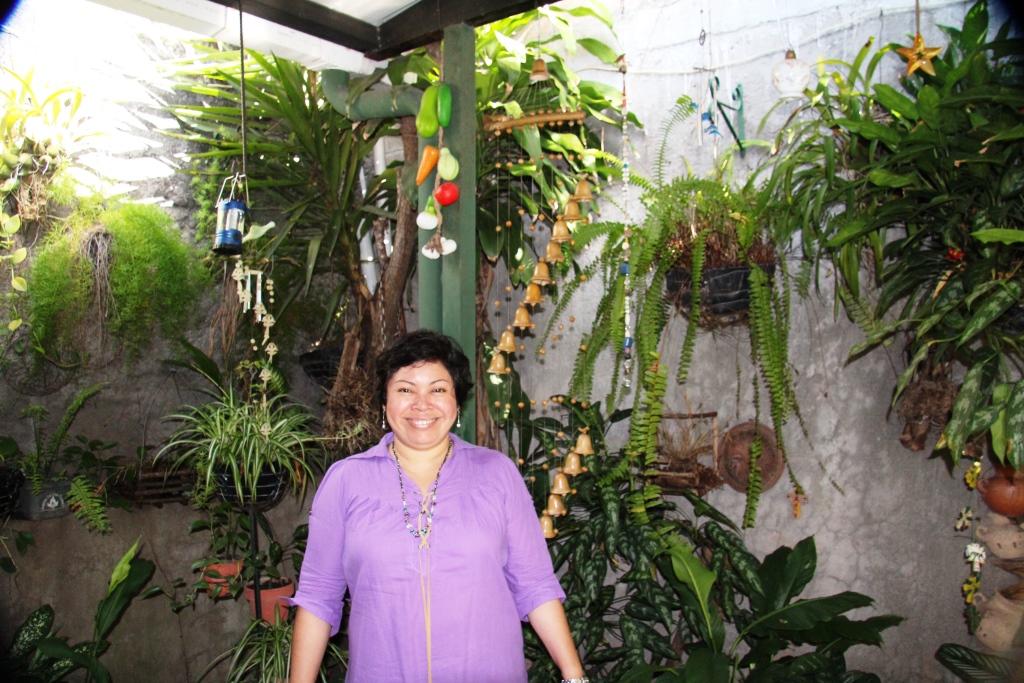
Carolina in her outdoor courtyard
[Editor’s Note: Many of our readers personally know Carolina as the charming guesthouse hostess of The Oasis in San Salvador, which she and her husband, Damian, own and operate. When Carolina smiles, her entire body smiles, and she lights up a room. When we interviewed Damian several years ago, he shared snippets of Carolina’s story through his eyes. This time we wanted to hear her remarkable story of a girl transformed into nun transformed into guerrilla fighter transformed into . . . through her own eyes and reflections of her life. To Carolina’s credit, she has been working hard on her English fluency, and today’s interview did not require a translator.]
“I love you because you cared for me.” (Read why she is so endeared to this quote.)
Can you describe some of the joys of your childhood?
I am the second of four daughters, born on March 27, 1968, to my mom, who was raising us alone near the town of San Francisco, Chinameca, in La Paz. My best memory of living there as a little girl was eating the delicious pupusas my grandma made us. She was a good cook and used to cook for the whole family.
Your mother raised four girls without a husband. She must have been a strong woman. Can you elaborate on her?
My mother is my hero. She supported us by being a dressmaker as a profession. She taught me those skills which became my first profession, also. She was a good teacher, and I still use those skills. She is 65 years old and no longer works.
What were the worst memories you have as a child?
When I was six years old, my mother said, “We have to go because your uncle died and it’s too dangerous to live here. Go, go, go.” This uncle, my mom’s brother, was supporting the election of a Christian Democrat man to be a mayor. The military ruling the country was not happy with him and conducted fraud to avoid this. Some of my relatives, including my uncle, were shot in the process. I was afraid, scared. I had never been anywhere else before.
For our safety my mom moved us into San Salvador where we stayed as refugees in Seminario San Jose. This was the place we lived for several years.
Can you describe your living conditions in the church, how you spent your time there, and how long you lived there?
We lived there for five years until I was eleven. Many people came from different places. They needed food and shelter. The seminary served as a large shelter. During the first year basic survival was difficult due to the food and water shortages. There were no beds, requiring us to sleep on the floor. Later there was more organization to provide one meal a day called atoll – a mixture of corn and drink. Cots were later sent in for sleeping.
But we were safe because the military did not disturb us. People somehow made the best of the situation and shared their skills with one another. I learned guitar and many songs, for example. My mother was a dressmaker for many people in the church. There was no school available.
Did we understand Damian correctly that you were once a nun? Was there a priest you were close to?
I was a church leader, a catechist, of the children and had many friends who were religious women. Sister Hna.Lupita (Oblatas del Corazon de Jesus), the Mother Superior, approached me about being a nun. I didn’t know, but decided to go to the convent where I lived for three years. It is a process of being in and out with the people, not sequestered.
The Oblate order appealed to me because they work within the communities. They dress the same as the people they serve. When a nun wears a “habit,” she stands aside from others which is not the image I wanted to portray. I was considered “pastoral social” and worked in Jayaque. Yes, there were some Jesuit priests, including Jon Cortina, who were working with the people. Some of them were later killed.
During the civil war in 1989, the convent chief instructed me to go home for two weeks after which they would send me to France. When I got home, I discovered that both my mother and sister were working for the FMLN (guerrilla movement). My mother asked me to join them and help out during those two weeks. I participated as a nurse to help bandage the wounded. During this time I was captured and tortured. When I left the prison, I decided to support my people and returned to the mountain to fight for the rights of my people.
Are you emotionally able to describe the details of your torture and release?
My capture was in December, 1989. It is hard and painful to bring back that memory but many had similar experiences and mine was no different. My torture was not physical. It was more deprivation. I went for many days without being allowed to sleep. They used water torture on me. I was so lucky because there were many who never came out alive. They were simply shot.
In my case I credit Maria Berta and Father Cortina who came to the Policia Hacienda where I was being held and kept vigil and put on pressure for my liberation for an entire month. Father Jon Cortina, a Jesuit priest, was a close family friend from the time I was very young, visiting the refugee center in which I lived. He was responsible for arranging my release. I was in prison for four months, being released in March of 1990.
What kinds of post-traumatic stress effects did you suffer as a result of that experience?
I had trouble sleeping for many years afterwards. That is all passed now.
What happened subsequent to your prison release?
When I was captured, I made the decision not to continue the process of becoming a nun. I returned to the mountains to continue to participate in the FMLN movement after I was liberated from prison and remained there for three years until the end of the war and the signing of the Peace Accords.
I was in Guazapa, Chalatenango, and many other places where there was heavy fighting. Working as a nurse, I cared for both the FMLN fighters as well as the military soldiers. We tried to stay in one location as long as we could until the military penetrated our position. Then we had to move.
Do you have one specific story from that period of time that stands out in your mind that you wish to share?
Actually, I have vivid memories of two experiences. One day the military bombed us with many aircrafts. I was near a young 16-year-old boy. He had stood up during the bombing and got hit and asked me, “I didn’t die?” I responded, “No, you didn’t die,” but ten minutes later he did. I dreamed about that boy for many years, haunted by that memory.
The other experience is with “the enemy.” As a nurse I cared for injured soldiers of both sides. When the FMLN captured military soldiers in combat, I took care of the injured. There was one boy I looked after for a week, and he said to me, “Why do you care for me if they are going to kill me?” I told him, “You are not going to be killed. We want you to survive. You are not an enemy of the people.” He responded, “I love you because you cared for me.” I was told this was not normal and showed how appreciated I was. That has really stuck with me all these years.
I read that among your roles in the war you were also a missile launcher. Is that accurate?
NO! We all carried weapons to defend ourselves; however, including the nurses. {She shows us photos of her diminutive sister holding a very large rifle.}
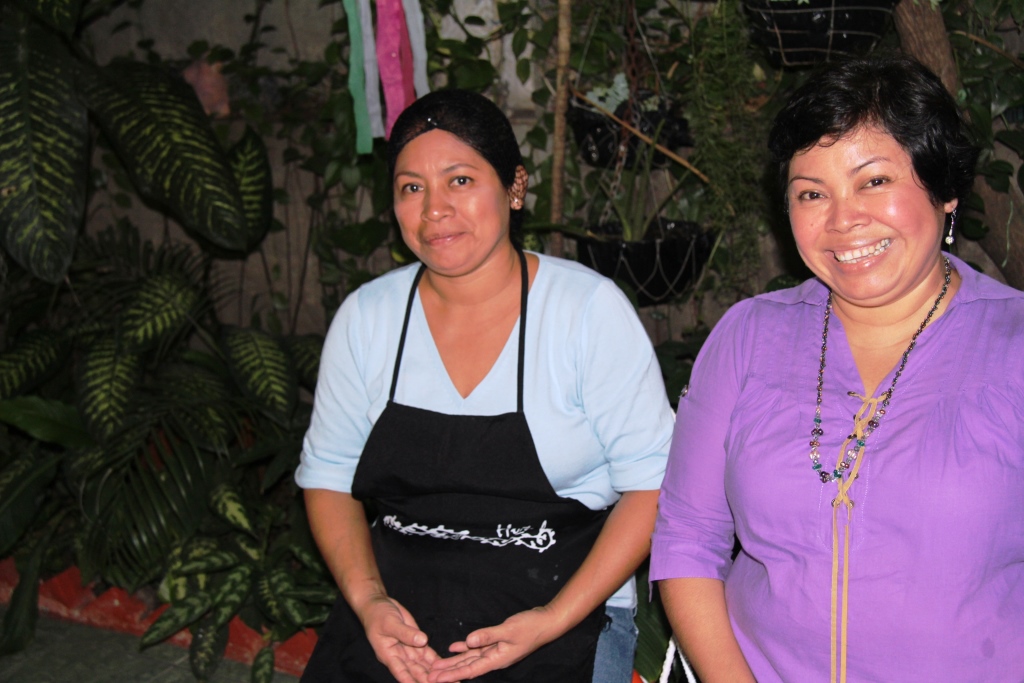
The life in the mountains was difficult with the killing and dying around you, uncertainties on a daily basis. What sustained you during that time?
The personality of the people remained strong. We all looked at the situation as a temporary thing, knowing life would improve for us later.
Were there opportunities for spiritual presence while fighting in the mountain? This, I believe, was the area in which the beloved Belgian priest, Father Rogelio Poncele, served. Did you personally know him?
Yes, it was important to have a spiritual person comfort the troops. The priests brought the sacrament into the camps. Bishop Rutilio Sanchez and many others came into the camps. I knew of Father Poncele, and yes, the people truly loved him.
We know you met Damian during the war. Tell us the love story. Who spotted whom first?
{She shrugs her shoulders and laughs.} Damian was a family friend for many years. He returned home after being released from prison at the same time I was sent to prison. We got re-acquainted during the war in Guazapa in 1989 and married in 1990. He was a respected leader during this time and worked under the FMLN leader, Shafick Jorge Handal, who just died five years ago. {She shares a photo of them together.} Damian served as a combatant and political leader in Guazapa.
After the war ended, what were your and Damian’s plans?
We had nothing: no house, no jobs, nothing but love. My mom invited us to live with her in San Salvador. Damian’s mom invited us to live with her in her house. We stayed with my mom for six months. Damian opened a radio station for the FMLN. As a civilian he worked to support ex-combatants. Father Cortina offered me a job in the University of Central America (UCA) office, encouraging me to study there when not working.
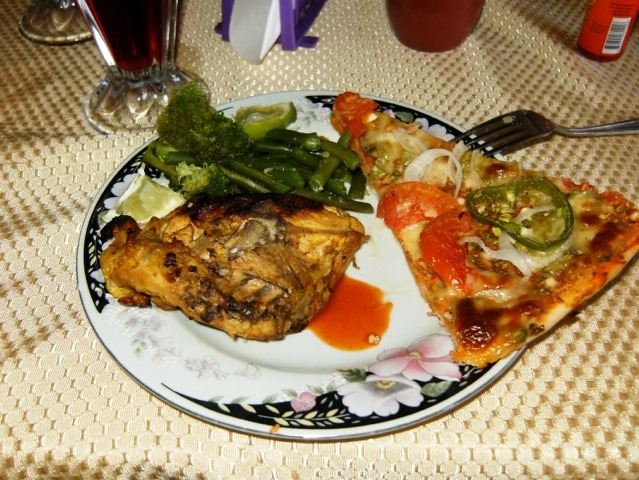
Did you take Father Cortina up on this offer?
Yes. I studied for five years resulting in a degree in business administration. Damian earned a degree in economics from UCA.
This sounds like the perfect combination of skills for opening a guesthouse.
It was. Damian and I had a conversation about this. There was another factor in the decision, also. We had a young son, Damian, and I was pregnant with Mauricio. We decided that a guesthouse was a good choice for a career because we could raise a family while operating a business. It has worked out well for us these 18 years.
Do you have retirement plans? Do you ever get breaks to get away?
We have no current plans to retire. We work very hard from January to August. There are fewer guests from August to December allowing us to take vacation. I accompanied Damian on a speaking engagement to San Francisco last year. We hope to visit Guatemala next November.
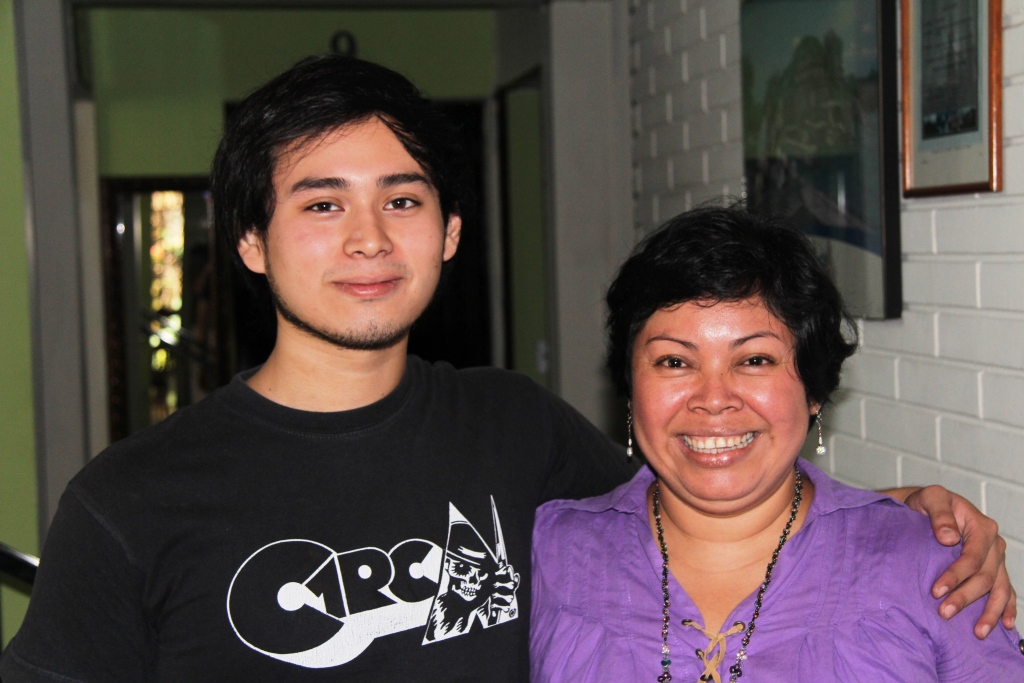
Carolina and her talented son, Damian
Have you noticed changes in your guests over these 18 years?
I don’t consider our guests as tourists. They are mostly like you who come for very specific reasons, such as to serve as church groups or to visit in the communities. We have a lot of repeat guests.
When you returned to your hometown after the war, what condition was it in?
After the Peace Accords we returned to La Paz and couldn’t even recognize it. There were no buildings; the entire town was destroyed. All that was left were a few trees.
What were your feelings when you saw that?
I was sad and angry. All my childhood memories were in a location that no longer existed.
What is happening in your life now?
Damian continues to serve as a representative in the legislature. I recently completed my Master’s degree in tourism. Our older son, Damian, is now studying art at the National University while Maurico is completing high school. He is a member of the Symphonic National Orchestra. His dream is to study engineering at UCLA in California. We have no family there and are naturally concerned about the distance and lack of support. Time will tell.
What hopes and dreams do you have for your country?
I hope for peace and the end to violence. I would like to see greater security and more employment opportunities as well as more youth attending universities. I dream of a more tranquil life for all who live in cities.
We are already seeing positive change in better hospitals and in our education system.
Our El Salvador Committee recently made a donation to a group that is near and dear to your heart. Are you and Damian still actively involved in Father Cortina’s group, the Asociacion Pro Busqueda (Association searching for the missing/kidnapped children from the war)? Most of them would now be adults. How long will that group continue to search?
It has been difficult to find those missing children, but over 300 have been located. Many have been found living in other countries. The parents who lost them say, “Please continue to search; I need to find my child.” They are getting older and find it necessary to have an answer before they die. Just next week we have a friend coming in from Berkeley, CA who identifies DNA, through Genestista [geneticists] who is spending a month here working.
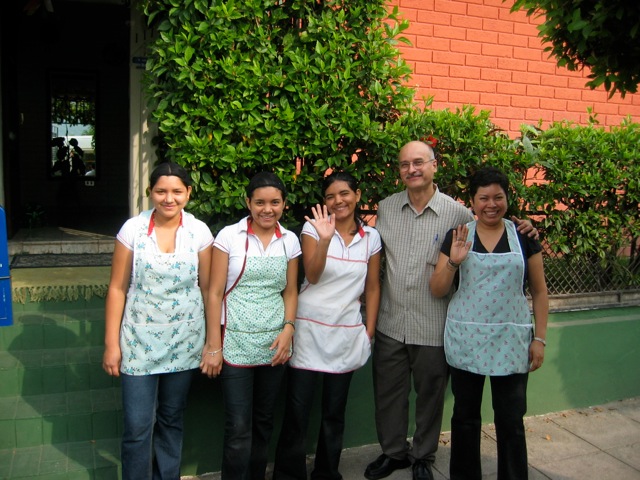
Editor’s Note: Carolina and I laugh about sharing the same name. That is where the similarities end. From the time she was six years old Carolina’s life has been on a roller coaster. You wouldn’t know it to meet this smiling, gracious woman. She has had so many different roles in her life and I’m certain has handled each one of them with dignity and grace. This is why we so wanted readers to know more about what is concealed behind that lovely, beaming smile she wears so well.


